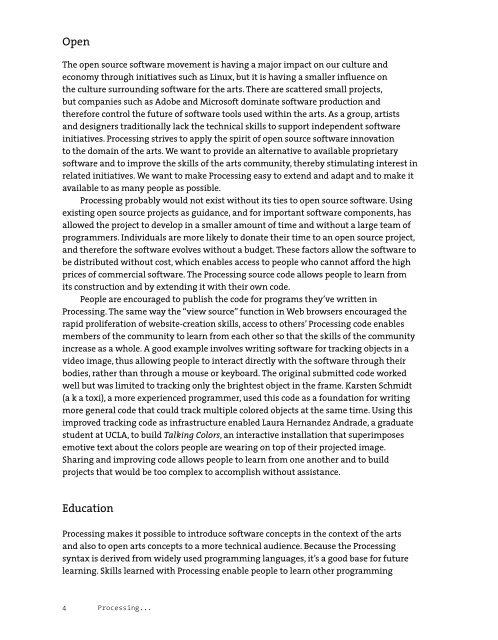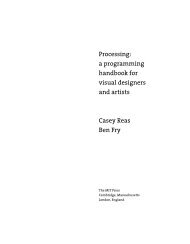Fractal.Invaders, Substrate (Interview with Jared Tarbell) - Processing
Fractal.Invaders, Substrate (Interview with Jared Tarbell) - Processing
Fractal.Invaders, Substrate (Interview with Jared Tarbell) - Processing
You also want an ePaper? Increase the reach of your titles
YUMPU automatically turns print PDFs into web optimized ePapers that Google loves.
Open<br />
The open source software movement is having a major impact on our culture and<br />
economy through initiatives such as Linux, but it is having a smaller infl uence on<br />
the culture surrounding software for the arts. There are scattered small projects,<br />
but companies such as Adobe and Microsoft dominate software production and<br />
therefore control the future of software tools used <strong>with</strong>in the arts. As a group, artists<br />
and designers traditionally lack the technical skills to support independent software<br />
initiatives. <strong>Processing</strong> strives to apply the spirit of open source software innovation<br />
to the domain of the arts. We want to provide an alternative to available proprietary<br />
software and to improve the skills of the arts community, thereby stimulating interest in<br />
related initiatives. We want to make <strong>Processing</strong> easy to extend and adapt and to make it<br />
available to as many people as possible.<br />
<strong>Processing</strong> probably would not exist <strong>with</strong>out its ties to open source software. Using<br />
existing open source projects as guidance, and for important software components, has<br />
allowed the project to develop in a smaller amount of time and <strong>with</strong>out a large team of<br />
programmers. Individuals are more likely to donate their time to an open source project,<br />
and therefore the software evolves <strong>with</strong>out a budget. These factors allow the software to<br />
be distributed <strong>with</strong>out cost, which enables access to people who cannot afford the high<br />
prices of commercial software. The <strong>Processing</strong> source code allows people to learn from<br />
its construction and by extending it <strong>with</strong> their own code.<br />
People are encouraged to publish the code for programs they’ve written in<br />
<strong>Processing</strong>. The same way the “view source” function in Web browsers encouraged the<br />
rapid proliferation of website-creation skills, access to others’ <strong>Processing</strong> code enables<br />
members of the community to learn from each other so that the skills of the community<br />
increase as a whole. A good example involves writing software for tracking objects in a<br />
video image, thus allowing people to interact directly <strong>with</strong> the software through their<br />
bodies, rather than through a mouse or keyboard. The original submitted code worked<br />
well but was limited to tracking only the brightest object in the frame. Karsten Schmidt<br />
(a k a toxi), a more experienced programmer, used this code as a foundation for writing<br />
more general code that could track multiple colored objects at the same time. Using this<br />
improved tracking code as infrastructure enabled Laura Hernandez Andrade, a graduate<br />
student at UCLA, to build Talking Colors, an interactive installation that superimposes<br />
emotive text about the colors people are wearing on top of their projected image.<br />
Sharing and improving code allows people to learn from one another and to build<br />
projects that would be too complex to accomplish <strong>with</strong>out assistance.<br />
Education<br />
<strong>Processing</strong> makes it possible to introduce software concepts in the context of the arts<br />
and also to open arts concepts to a more technical audience. Because the <strong>Processing</strong><br />
syntax is derived from widely used programming languages, it’s a good base for future<br />
learning. Skills learned <strong>with</strong> <strong>Processing</strong> enable people to learn other programming<br />
4 <strong>Processing</strong>...



